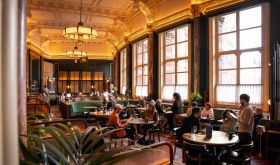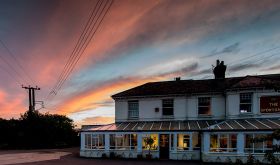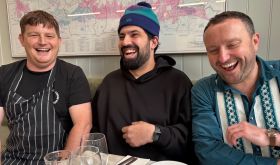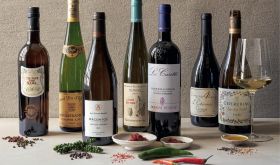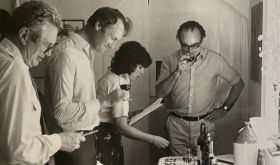Over the past year, with their chefs and sommeliers sidelined, restaurateurs have had to come up with creative ways to stay in business. Up to a third of all UK restaurants may have closed, but many have survived by moving to new business models.
I asked eight chefs and restaurateurs to explain who, or what, had been most helpful in surviving the past year.
Michel Roux Jr, Le Gavroche, London
Just before the first lockdown I took on a young office assistant. When COVID struck, I explained that sadly I had to let him go.
He then explained that in the short time he had been with us he had had a vision of what he could bring to the company. He told me our social media was lacklustre and our website was ancient and costly to run. He said he could design a simple, cost-efficient website and incorporate a shop to sell books and items with a Le Gavroche logo. During lockdown he got to work and I gradually took him off furlough to the extent that soon he was back full time. The online shop went crazy, boosted by a huge leap in followers on all our social media channels. We now average £18,000 per month with special boxes, wines and other branded items. I feel very lucky to have him.
Chris Ammermann, Caravan Coffee, London
Looking back at that horrible time, the most important thing that happened was the decision we made not to make anyone redundant. Ultimately, we just couldn’t face laying people off with no options for alternative employment and then we hoped and prayed the government would help.
It’s been an awful time with the constant opening and closing of sites, COVID safety measures forced upon us, curfews, track and trace, masks and sanitiser – and, of course, we have lost a huge amount of money.
But our take on Monday 12 April [when outdoor dining was finally allowed in England] was 2% more than the same Monday in 2019, which is not bad for a freezing cold day in April. And yesterday, 15 April, we took more than £50,000, which is much more than we might have hoped for.
Will Beckett, Hawksmoor, London, Manchester and Edinburgh
Lots of key decisions were made – getting as much debt as we could as early as possible [when interest were at their lowest], starting Hawksmoor at Home, experimenting with retail to help us and our farmers – but I think the best decision was made by the person who started Hawksmoor Run Club. Lots of people who work here decided to aggregate their running miles and convert them into an imaginary, sponsored road trip from London to Manchester to Edinburgh over 30 days. A fun idea which ended up being hugely bonding, healthy and raised lots of money for Hospitality Action.
Shamil Thakrar, Dishoom, London
I’m very glad we managed to retain everyone’s jobs and that we’ve had a high degree of focus on well-being. It has certainly tested us financially, but we’ve managed to make it work.
Quickly launching the delivery and meal-kit businesses has been critical for us. Although the restaurants have all been closed for months, the new businesses mean that we are doing more or less half of our previous sales and have reduced our (previously very high!) cash burn to close to zero. [Cash burn is the rate at which a business loses money, cash outflow.]
Chris Galvin, Galvin Restaurants, London
From day one my brother Jeff kept us ahead of the curve. He drove the Galvin at Home service, created cook-along videos and live cooking Q&As and branched out into corporate dining.
We have learnt far too much about digital platforms, sustainable packaging, cardboard boxes, branded tape and stickers, as well as the vagaries of various delivery companies. Without his drive we could never have kept up with the crushing fixed overheads and rent. Not quite a saint but close!
Danny Meyer, CEO Union Square Hospitality Group, New York
Without our amazing chief people officer Patti Simpson we would never have been able to go through the very difficult tasks of laying off so many members of our team (with both clarity and compassion) and then subsequently to rebuild our teams when finally permitted to open our restaurants. Patti also led our HUGS Fund, helping us to raise and grant close to $2 million to our out-of-work team members.
Hazel Allen, Ballymaloe House, Ireland
The best decision that helped Ballymaloe was to start hosting a NeighbourFood market [box collection] at the cookery school. It gave many of our suppliers an outlet for produce that would normally be bought by restaurants. It also gave the Ballymaloe farm an outlet for much of our own produce that would have been destined for the hotel: meat, eggs, fruit, cider, etc. The kitchen then began to cook food to sell through NeighbourFood, which generated work for the kitchen and front-of-house teams. My nephew, Darina Allen’s son Toby, deserves the credit for this.
Charlie Young, Vinoteca, London
A few weeks into the first lockdown we decided to reopen Vinoteca Chiswick as a shop, selling our wine and other drinks as usual and also homemade sourdough, cured meats, cheese, flour and pasta. But we also decided to develop ‘finish at home’ dishes, which in turn led to meal kits with matching wine, available for delivery within the M25. Key to this were our Chiswick head chef Tim Ingle and general manager Sandro Costa. We were then able to use this template at our other sites as the country went in and out of lockdowns. Invaluable!




